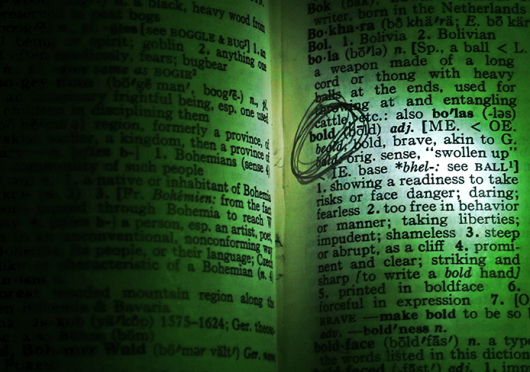It might not be surprising that, at times, some students find themselves searching for the right word, and in turn, searching for a dictionary.
What might be surprising is that a popular online dictionary has done some searching of its own. Specifically, it’s done research among lookup entries at some U.S. universities, including Ohio State.
Dictionary.com has determined the most popular word searched on its website among students at OSU in 2014 was “bold.”
Yes, bold.
According to a Dictionary.com analysis, bold appeared more than any other word at OSU from within a sample of more than 10 million searches in zip codes associated with OSU’s campus, including nearby, student-populated off-campus neighborhoods.
OSU was one of 100 universities from which data was collected, said Rebekah Otto, director of content at Dictionary.com. Schools were picked to allow variation in location, student population size and university type, Otto added.
The schools surveyed ranged from private universities like Stanford University, where “blithe” came out on top, to the U.S. Military Academy, where “ethics” proved most popular.
Other universities’ most popular searches included “sustainability” at Harvard University, “Judeo-christian” at the University of Notre Dame, and “gag” at the University of Wyoming.
Otto said Dictionary.com’s analytic team found the results quite interesting, in that the top-searched words at the university level deviated broadly from words typically looked up on the website.
“At universities, students seem to be gravitating toward exciting and unique words, like ‘cubism,’ ‘pneumatic,’ ‘maelstrom’ or even a word like ‘bold,’” she said.
Otto said OSU students shouldn’t feel underwhelmed or disappointed with the results, and that reasons for bold lookups could be attributed to students taking design courses, investigating font types or checking up on literary descriptions.
“People go to the dictionary for all sorts of reasons,” she said. “They go to the dictionary a lot of times because they already know what a word means, but they’re trying to use it in a new way, or they’ve heard it used in a new way and aren’t entirely sure what it means in this context.”
Bold can be defined several ways, including “not hesitating to break the rules of propriety,” “necessitating courage and daring” and “striking or conspicuous to the eye,” according to Dictionary.com.
Otto said the dictionary is a solid resource for students trying to “distill the meaning of a word,” while trying to seek out new ways to express an idea.
“Most of what college students do is spend their time writing papers, responding to short essay questions and really growing their own voices, so when they leave school, they can communicate,” she said.
Javier Angel, a fourth-year in linguistics, said he feels the word is pretty straightforward, but understands that it might confuse students coming across it in an unfamiliar context.
“Different senses of the word ‘bold’ are appropriate for different contexts, and maybe that causes some confusion,” he said. “Maybe it has different senses that people aren’t sure whether or not fit in a certain context.”
He added that some words might prove to be especially confusing for some international students or students who have learned English as a second language.
Kelley Fitzgerald, a third-year in nursing, said she could imagine students looking up the word to find different ways of using it, but that the bold result still caught her a little off guard.
“It’s definitely surprising,” she said. “It’s not a hard word to understand, and it’s a pretty common one.”
Rounding out the top five most-searched words at OSU were “affect,” “autotroph,” “sociopath” and “heterotroph,” Otto said.
Evan Thomas, a Ph.D. candidate in English, said that bold might be included in words commonly thrown around by students that require further investigation online.
“Maybe bold is something that people feel very confident (saying) in conversation, but in private, they might feel like they need to check it out,” he said. “In private … they’re willing to admit that they don’t know.”
Thomas said he believes in the “dictionary habit,” which is making the habit of using a dictionary on a regular basis, 100 percent, and added that he thinks students shouldn’t feel timid double-checking the meaning of a word.
“I recommend that my students always use a dictionary when reading through nearly anything,” he said. “Some really surprising things can develop from that habit.”
Fitzgerald said she has made a habit of investigating new words, adding that she looks up at least one new word every day. She said her most recent search was “accusatory” on Thesaurus.com.
“I look up words a lot,” she said. “I do it all the time — at least once a day.”
No data was provided concerning popular search entries among University of Michigan students, but Fitzgerald offered a guess.
“Probably ‘Ohio State,’” she said laughing. “They’re just so curious about us all the time.”
Fitzgerald said she understood that was a bold assumption.



